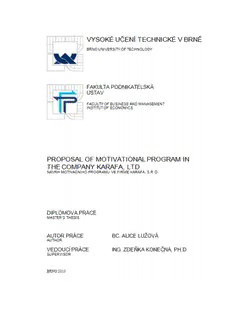
list of abbreviations PDF
Preview list of abbreviations
ABSTRAKT Obsahem této práce je analýza personálních činností ve společnosti Karafa, spol. s r.o. Karafa, spol. s r.o. je přední maloobchodní prodejce květin v České republice a v současnosti řeší problém vysoké fluktuace zaměstnanců a jejich nedostatečnou motivaci. Autor této práce použije především dotazník a další výzkumné metody, aby zjistil, jak jsou zaměstnanci spokojení se svou prací, a čím jsou motivováni. Cílem této teze bude návrh řešení, které pomůže zdokonalit personální činnosti a procesy ve firmě Karafa, spol. s r.o. ABSTRACT Objective of this thesis is to analyze the HRM functions within the company Karafa Ltd. Company is leading retailer sales of flowers in Czech Republic and currently is solving issues with high fluctuation of manpower as well as lack of motivation. Author of this thesis is going to apply particularly questionnaire and other research methods to determine how employees are satisfied with their work and what motivates them. The purpose of this thesis is to suggest feasible solution that can improve HRM functions in Karafa Ltd. KLÍČOVÁ SLOVA Personalistika, lidské zdroje, řízení lidský zdrojů, motivace, spokojenost zaměstnanců, zaměstnanci, analýza, maloobchod, dotazník. KEY WORDS Personnel management, human resource, human resource management, motivation, job satisfaction, employees, analysis, retail trade, questionnaire survey. Bibliographic Citation LUŽOVÁ, A. Proposal of Motivational Programme in the company Karafa, Ltd.Brno: Brno University Of Technology, Faculty of business and management, 2010. 126 p. Supervisor of Diploma thesis Ing.ZdeňkaKonečná, Ph.D. Declaration I declare that this master‟s thesis is my original work. Any uses of the works of other authors have been properly acknowledged under the terms of the copyright law. A full list of the references employed has been included. Brno, 31th August 2010 …………………………………. Alice Lužová Acknowledgements I would like to thank my supervisor Ing. Zdeňka Konečná, Ph.D for her guidance, consideration and valuable feedback. Moreover, I would like to thank management of Karafa, Ltd. for giving me an opportunity to realize my master´s thesis in their company and providing me all information about firm. In addition, I would like to thank all the participants of questionnaire and interview survey. Content INTRODUCTION ....................................................................................................... 10 1 AIM OF THE THESIS ............................................................................................. 12 2 THEORETICAL BACKGROUND .......................................................................... 13 2.1 Human Resource Management ......................................................................... 13 2.1.1 Personnel Management versus Human Resource Management ................... 13 2.1.2 Human Resource Management ................................................................... 18 2.1.3 Models of Human Resource Management .................................................. 20 2.1.4 Criticisms of HRM ..................................................................................... 23 2.1.5 Strategic HRM ........................................................................................... 24 2.1.6 People Resourcing ..................................................................................... 25 2.2 Motivation ....................................................................................................... 29 2.2.1 Role of Motivation ..................................................................................... 30 2.2.2 Motivation Theories ................................................................................... 30 2.3 Job Satisfaction ................................................................................................. 38 2.3.1 Job Satisfaction Theory .............................................................................. 39 2.3.2 Measuring Job Satisfaction........................................................................ 40 2.3.3 Factors Affecting Job Satisfaction .............................................................. 41 2.4 Communication ................................................................................................ 44 2.4.1 Rethinking Management Communications ................................................. 45 2.5 Employee Retention .......................................................................................... 46 2.6 Employee Turnover .......................................................................................... 47 2.7 Questionnaire Theory ....................................................................................... 48 2.8 Summary of theoretical background .................................................................. 49 3 ANALYSIS OF CURRENT SITUATION ............................................................... 51 3.1 Company Overview .......................................................................................... 51 3.2 Organizational Structure ................................................................................... 52 3.3 Financial Information ....................................................................................... 53 3.3.1 Financial Ratios ......................................................................................... 54 3.4 Human Resource Management ......................................................................... 57 3.4.1 Recruitment and Selection .......................................................................... 57 3.4.2 Training ..................................................................................................... 58 3.4.3 Performance Appraisal and Reward system ................................................ 59 3.4.4 Communication .......................................................................................... 60 3.4.5 Motivation of Employees ........................................................................... 60 3.5 Company Research ........................................................................................... 61 3.5.1 Research Methodology ............................................................................... 61 3.5.2 Interview .................................................................................................... 61 3.5.3 Questionnaire ............................................................................................. 63 3.5.4 Questionnaire Interpretation ....................................................................... 66 3.6 Analysis summary ............................................................................................ 98 4 PROPOSALS FOR IMPROVEMENT .................................................................. 100 4.1 Establishment HR Department ........................................................................ 100 4.1.1 Recruitment and Selection ........................................................................ 102 4.1.2 Training and Development ....................................................................... 102 4.1.3 Performance, Reward and Appraisal ........................................................ 103 4.1.4 Communication ........................................................................................ 104 4.2 Motivation of Employees ................................................................................ 105 4.2.1 Goal Setting ............................................................................................. 105 4.2.2 Engagement of Employees ....................................................................... 106 4.2.3 Recognize and Reward High Performance ............................................... 107 4.2.4 Motivation according Questionnaire Research .......................................... 108 4.3 Summary of Motivational Proposals and Their Costs ...................................... 112 CONCLUSION ......................................................................................................... 113 REFERENCES.......................................................................................................... 115 LIST OF ABBREVIATIONS .................................................................................... 120 LIST OF TABLES .................................................................................................... 121 LIST OF PICTURES................................................................................................. 123 LIST OF CHARTS.................................................................................................... 124 LIST OF APPENDICES ........................................................................................... 126 INTRODUCTION According to increasingly turbulent external environment post modern organizations have to develop. Many external factors impact on organizations and their behaviour. Environmental uncertainty is connected with a change in the external political, economic, social, technological, legal and ecological context in which organization operates. Majority of organizations are affected especially by three main trends which are globalization, information technology, social and demographic trends. To fit into turbulent environment, organization has to become networked, information- rich, de-layered, downsized, lean, boundary-less, high-commitment organization that employs highly skilled and well-paid, autonomous knowledge workers. All of this is connected with history and information age. Post modern organizations developed themselves from modern organizations which developed themselves from classical ones. Organizations have undergone an evolution from rigid bureaucracy, macho managers, boring jobs to the present flexible organizations with supportive and participative managers and interesting empowered jobs. Organizations are expected to act ethically and in ways that consider, contribute to and benefit economic development, environment, Quality of working life, local communities and society at large. We must consider that organizations operate in unpredictable and turbulent environment which change very quickly. The role of personnel management was transformed through the years as the ways in which people are managed, rewarded and motivated came to be recognised as being fundamental to organizational survival and competitive advantage. The effectiveness of human resource function is viewed as being crucial to the strategic and financial success of the organization. Organizational strategy has to be supported by series of personnel policies that are set by human resource management. There has to be an authority managing relationship 10
Description: